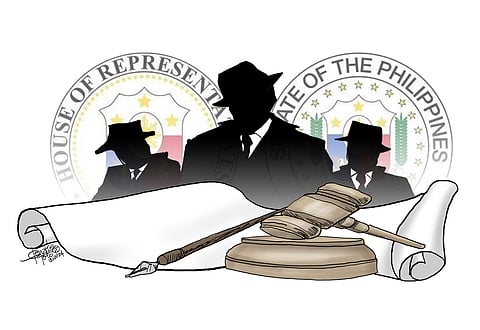
- NEWS
- the EDIT
- COMMENTARY
- BUSINESS
- LIFE
- SHOW
- ACTION
- GLOBAL GOALS
- SNAPS
- DYARYO TIRADA
- MORE

While many Filipinos do not own P1 million, Senators and members of the House of Representatives move billions of pesos of public money into the yearly budget, without compunction, to revive the pork barrel system.
Thus, budget watchdogs have sought the Supreme Court’s intervention in questioning the 2025 budget and the opaque process employed in drafting the outcome.
The main issue that needs to be addressed is the role of the bicameral conference committee, which has evolved into a powerful entity created by Congress to manage pork barrel spending in both the Senate and the House of Representatives.
In the initial stages of budget deliberations, a certain degree of transparency is observed in the discussions of the budget since it is live-streamed.
In the final stages of processing the budget, it is sent through the bicameral conference committee meeting where members of the Senate and the House come together to reconcile the differences in the versions of the budget of both chambers.
What happens in that meeting is not known to the public because it happens behind closed doors.
“No one knows who are making the decisions in terms of analyzing the budget and as we’ve seen in the result of the bicameral conference in the 2025 General Appropriations Bill, they’ve increased the Department of Public Works and Highways budget by P288.7 billion, zero subsidy for the Philippine Health Insurance Corp. (PhilHealth), and reduced the Department of Social Welfare and Development (DSWD) budget for Pantawid Pamilyang Pilipino Program (4Ps) by P50 billion, and other DSWD programs by P30 billion,” University of the Philippines School of Economics professor Cielo Magno said.
Magno, a former undersecretary at the Department of Finance said most of the changes in the budget for the past years were all made through the bicam.
“And there’s no documentation, we don’t have access to the minutes of the meeting,” Magno indicated.
Despite all the livestream discussions on the various items of the budget, the final output is drastically different and is the product of a handful of legislators deciding on what items to prioritize.
“We’ve heard our legislators saying that they have signed it without seeing the final version of the budget that they passed for the approval of the President,” according to Magno.
She said one of the insertions in the bicam for the 2024 budget was the Ayuda sa Kapos ang Kita Program (AKAP) with a P26.7 billion funding,
The Senate wanted the removal of the program in the 2025 budget but after the budget went through bicam, P26 billion was allocated, and “there’s the discussion that it will be divided into P21 billion for the House and P5 billion to the Senate in AKAP funds.”
Magno said that the legislators should not even be involved in the AKAP funds distribution since they are not supposed to have any role in project implementation.
“Their role is to allocate the budget but they are not allowed to take part in project implementation but here we are, with members of the House and the Senate talking about their share of the pie in the implementation of the AKAP program.”
The role of the bicam depends on the rules adopted by the Senate and the House so there’s not much effort needed to make it transparent.
Magno said that what it would take is just an earnest effort of legislators “to become more accountable to the people.”
Since the budget process involves how the government spends people’s money, questions on its possible misuse should be brought to the Supreme Court.
A primary issue that must be resolved is the circumvention of the Tribunal’s ruling in 2013 that the pork barrel and all similar schemes violate the Constitution.
